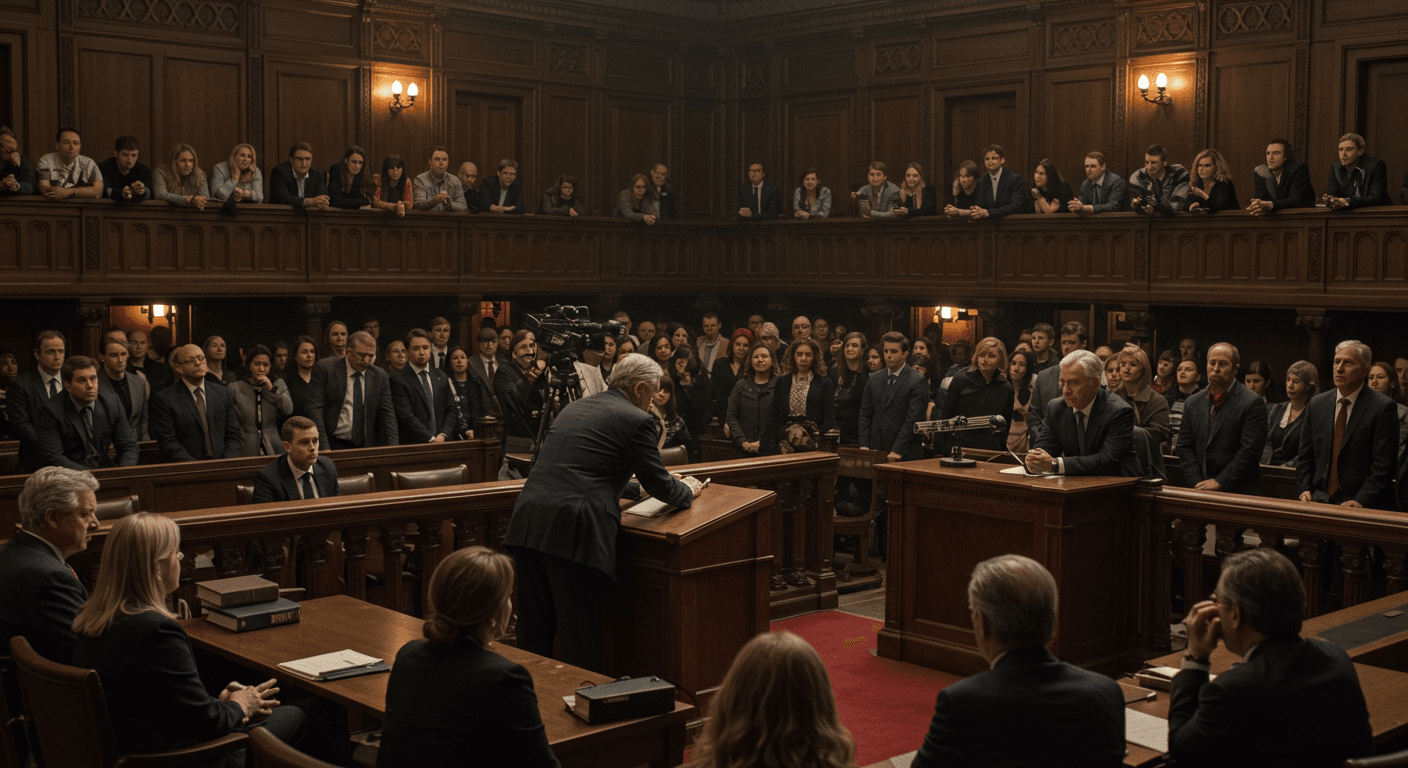Getting through the world of lawsuits can be like trying to find your way out of a corn maze: it’s hard, irritating, and maybe even a bit scary. You’re not the only one who has thought about suing someone or a company. Whether it’s because of a broken contract, an injury, or that time your neighbor’s tree knocked down your fence (thanks for nothing, Mr. Jenkins), knowing how things work is important. Let’s go on this legal adventure together!
Top Takeaways and Key Concepts
Confirm your reason for suing is valid. Make sure your case has a solid legal basis before filing.
Collect strong, organized evidence early. Gather documents, photos, and witness statements to build a convincing case.
Hire a lawyer who fits your needs. Choose one with relevant experience, good communication, and genuine interest in your case.
Follow all filing and court procedures carefully. Submit correct paperwork and meet every deadline to avoid costly delays.
Stay patient and persistent through discovery and trial. Lawsuits take time—stay organized, focused, and calm under pressure.
Summary of This Article
This article offers a witty yet informative guide to navigating the complex world of lawsuits, breaking down each stage of the legal process with humor and practical insight. It begins by explaining what it truly means to sue someone—not just seeking revenge or money, but restoring fairness. Readers learn how to gather solid evidence, from photos to emails, and why organization is crucial for success. The article emphasizes the importance of hiring the right lawyer—someone experienced, communicative, and trustworthy—and walking through the filing process properly, including serving the defendant correctly. It also highlights the discovery phase as the most unpredictable but essential step, where both sides exchange key information. Finally, it prepares readers for the emotional and procedural intensity of going to trial, reminding them to remain patient, realistic, and well-prepared. In the end, it concludes that lawsuits can deliver justice but require careful planning, persistence, and a clear understanding of whether the fight is truly worth it.
What Does It Mean to Sue?
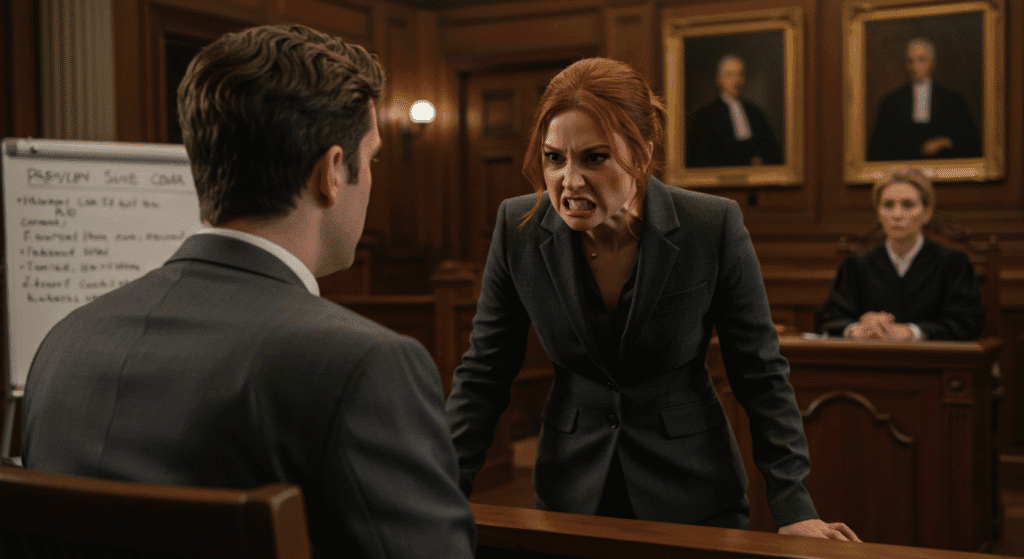
Please Note: This post may contain affiliate links. If you click one of them, we may receive a commission at no extra cost to you. As an Amazon Associate, I earn from qualifying purchases.
👓 When you sue someone, you’re not just asking for money; you’re also inviting them to a legal showdown that can feel like an episode of “Survivor.” In fact, the average lawsuit takes so long that by the time it’s over, both sides might need therapy for all the emotional stress—especially if they had to sit through endless depositions! 👓
“Lawsuits are like basketball games. The lawyers are the players, and the judge is the referee. But in this game, everyone walks away with bruises.” — Unknown
To start, let’s talk about what it means to sue someone. When you sue someone, you are saying that they owe you something, usually money, and you are taking them to court. This could be because they caused harm in an accident or didn’t keep their half of the deal. I think we can all agree that no one likes to go to court unless they have to. It seems more stressful than putting together IKEA furniture without directions.
It’s not always about striking back at someone or gaining revenge; sometimes it’s about getting justice and making things right. Imagine that you have been wronged and that the universe has turned you upside down and shaken out your pockets. You don’t simply want to get even; you want what’s right! When you’ve been wronged, think of it as leveling the playing field. For example, when someone keeps landing on Boardwalk with hotels in Monopoly, you can turn the tables.
The Wacky World of Suing: What It Really Means
– The “Sue” is Real: The word “sue” comes from the Latin term “sequi,” which means “to follow.” So when you sue someone, you’re really just following them around with legal papers—kind of like a persistent puppy!
– Not Just for People: You can sue corporations, but did you know that some people have even tried to sue inanimate objects? One person famously sued their own car after it broke down, claiming it caused emotional distress. Spoiler alert: the car didn’t show up in court.
– Paperwork Overload: Filing a lawsuit can involve mountains of paperwork. In fact, if all the documents were printed out and stacked, they could reach the height of a small building! So be prepared to channel your inner paperweight.
But before you dive in with both feet (and maybe some bad dance routines), you need to know what to do. This isn’t a last-minute road trip when you don’t care about the risks and hope for the best. No, my friend, this is more like plotting a big heist in a movie. You have to think about the specifics and come up with a strategy!
Have you ever tried to make something without any help? It can be annoying, right? Similarly, trying to figure out the legal system without knowing how it works can be confusing and cause problems that even a seasoned detective would have trouble with. There are some steps that must be followed very carefully in lawsuits. If you forget one small thing, you could have to start over, which is worse than tripping on a LEGO brick!
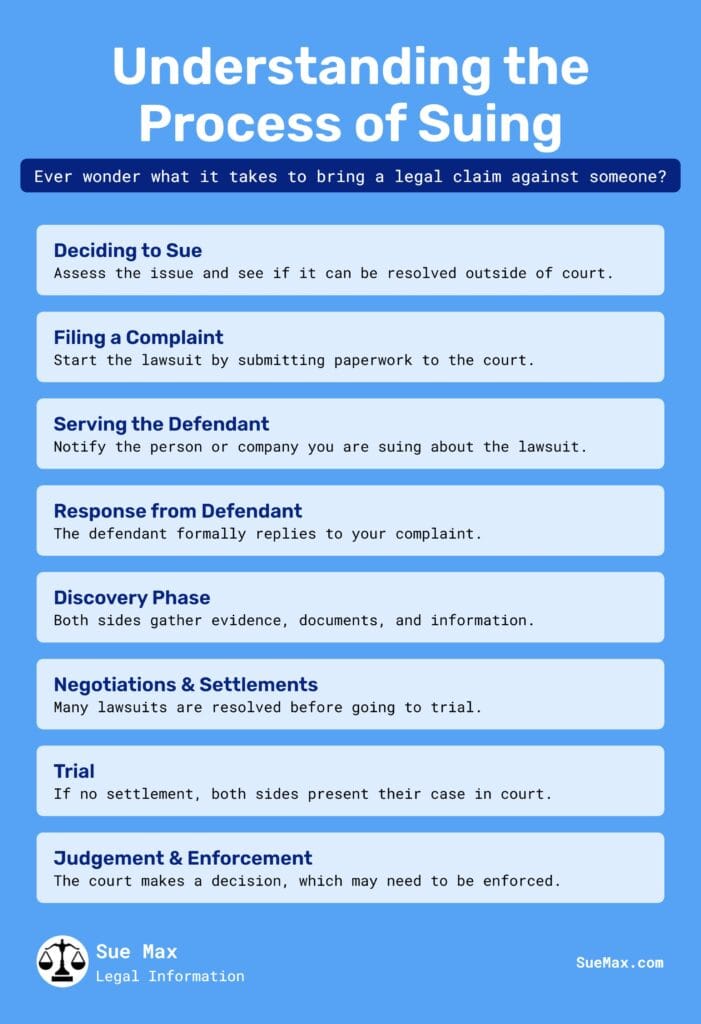
Knowing these processes also helps you keep your expectations in check. A lot of individuals file lawsuits because they assume they’ll get rich quickly or that justice will be delivered right away, like when you order fast food and expect it to arrive in five minutes. Warning: that’s not how things work in real life! You need to be patient because lawsuits might take months or even years to settle. It’s like waiting for the new season of your favorite TV show to start. You know it will happen, but time moves so slowly!
Knowing what you’re up against helps you get ready for what’s coming. You can run into problems along the way, like dealing with the other lawyer, who always seems to want to drag things out longer than they need to (why do they always seem so good at that?). Knowing what to expect at each step offers you confidence and helps you relax. Let’s face it: no one wants to feel like their heart is beating like they just ran a marathon every time they think about court.
It may seem like a scary chore to sue someone, with possible problems and enemies around every corner, but remember that at its heart, it’s a chance to fix things and restore fairness. So take a deep breath, get in touch with your inner superhero (cape not required), and get ready to battle injustice. Before you take those important initial steps, make sure you know what you’re doing!
The Initial Steps: Gathering Evidence

👓 When gathering evidence for a lawsuit, some lawyers have been known to collect everything from emails to napkin doodles. In fact, there’s a legendary case where a lawyer successfully used a client’s grocery list as evidence to prove their state of mind—because who wouldn’t be angry after forgetting the ice cream? 👓
“Evidence is like a puzzle; sometimes you have to turn it upside down and shake it until all the pieces fall out.” — Unknown
Let’s speak about what comes next now that you know the basics: getting evidence! Imagine yourself like Sherlock Holmes, but with less drama and fewer deerstalker hats. You need strong evidence to back up your case! This could include things like contracts, emails, photos from the scene of an event, and witness testimonies if they are needed.
Having detailed proof can mean the difference between winning your case and seeing it fizzle away like Coke that was left open on the counter last week. You know that feeling when you want a cold drink but find a flat, melancholy mess? That’s how it feels to find out that your case doesn’t have strong evidence. So, before you jump into this legal journey, ask yourself if you have everything you need. If the answer is “not quite,” take some time to get those important parts before going on. Believe me, you’ll be glad you did!
The Wild Ride of Gathering Evidence
– Treasure Hunt: Gathering evidence is like a treasure hunt, but instead of gold coins, you’re digging up receipts, emails, and maybe even that old pizza box from last year’s party. Who knew your leftovers could be so valuable?
– Witnesses are Like Cats: Getting witnesses to talk can be tricky. They often act like cats—hard to find when you need them and they might just stare at you blankly if you ask them to do something!
– Digital Detectives: In today’s world, much of the evidence is digital. You might spend hours scrolling through social media posts or emails. It’s basically like being a detective in a reality show where everyone has way too many selfies!
Now, let’s discuss about what “clear evidence” means. You could think that only major things, like contracts or formal papers, are important. But here’s the best part: no document is too little! A seemingly unimportant email exchange can sometimes turn into the smoking gun that helps you win. Think about getting an email from someone who mistakenly tells you about their misconduct or admits fault. It’s like finding buried gold!
Think about writing down everything that is said about your case. It might seem boring at first to take notes after conversations (who wants to be a detective?), but it could save you trouble later. These notes can help you remember things later and give you background information when you’re putting your story together. Also, if there are any witnesses who can back up what you say, having their testimonies on record can make your case much stronger.

Don’t forget about photographic evidence either! A picture may be worth a thousand words, or at least a few hundred in court! Take pictures of anything that can be seen, including broken property or an unsafe atmosphere, as quickly as feasible. Not only do they prove your case, but they also help people who look at it later see it clearly.
It’s not enough to just keep every piece of paper you find when you’re gathering evidence. Quality is important too! Put everything in order so that nothing gets lost in the shuffle. You may even make folders on your computer or in real life for this purpose. This way, when you have to present your case or meet with a lawyer, you’ll look like a rockstar who is ready instead of someone who is frantically looking for that one missing document.
Don’t underestimate how important clear and complete evidence is to your argument. Every item helps communicate your story and make you look trustworthy. So, think like Sherlock Holmes (without the pipe) and gather all the important clues. You never know which one will be the one that wins the case in court!
Finding Legal Representation

👓 In the quest for legal representation, it’s said that finding a lawyer is like dating: you might go through several before you find “the one.” Some people even joke that lawyers should come with warning labels, like “Caution: May charge by the hour and possess a penchant for dramatic courtroom speeches!” 👓
– “The law does not pretend to punish everything that is dishonest. That would seriously interfere with business.” — Clarence Darrow
It’s time to make another significant decision: selecting a lawyer once you’ve gathered all your proof and are ready to fight (figuratively speaking). It may seem scary to hire a lawyer; it’s like dating but with much more at stake! You need someone who knows what you’re going through and has worked on similar issues before.
Don’t be shy when you talk to possible lawyers! This is your chance to really look into everything and pick the best fit for your circumstance. You wouldn’t buy a car without checking the tires and asking how much gas it gets, would you? So why would you hire a lawyer any other way? You could ask them things like, “How often will we talk?” or “What’s your success rate?” These aren’t simply random questions; they’re important to make sure you’re on the same page. You deserve to know what’s going on here!
The Quest for Your Legal Sidekick
– Lawyer Shopping: Choosing a lawyer can feel like shopping for shoes. You try on a few, walk around in them, and hope they don’t pinch your toes—because no one wants to be stuck in an uncomfortable situation when going to court!
– The Lawyer’s Secret Weapon: Ever notice how lawyers seem to have endless supplies of pens? It’s like they’re hiding a secret stash somewhere! They need them for signing contracts, but let’s be honest—they probably use them to doodle while waiting for the judge.
– Consultation Adventures: Many lawyers offer free consultations. This means you can chat about your case without spending a dime. Just remember, it’s not a date; you don’t have to impress them with your favorite pizza toppings!
If you have a lawyer that can talk to you clearly, it will save everyone a lot of trouble later on. It’s hard to imagine trying to get through a maze while blindfolded, isn’t it? That’s how it feels when your lawyer doesn’t tell you what’s going on. Regular updates and clear explanations can help a lot with stress during this process, which can be very stressful.
It’s much easier to understand legalese when you have someone around who speaks it well. You know how you sometimes hear someone speaking a foreign language and wonder if they’re chatting about dinner arrangements or planning to take over the world? That’s how legal discourse can sound if you don’t have a professional translator with you. A good lawyer will explain things in a way that you can grasp, not just nod along like you’re at a concert.
Also, don’t be afraid to ask them if they are available. It might seem small, but knowing if they’ll be available when you need them might help you relax a lot. If they say they just check their emails once in a while while lying on the beach, you might want to think about it again. On the other hand, if they promise to check in with you regularly and respond quickly to critical situations, that’s great news!
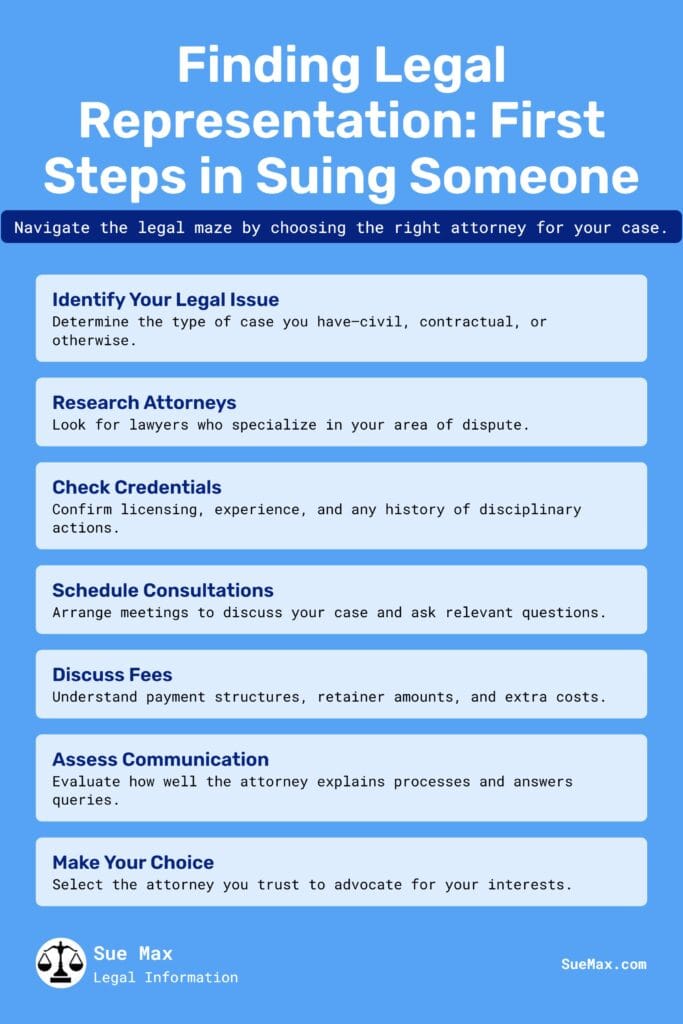
Another essential question can be regarding how they plan to handle your case. Every circumstance is different, so knowing how they plan to handle yours will help you grasp how they think and what they know. Have they worked on instances like this before? What strategies do they think will work best? This information not only helps you trust them, but it also indicates that they care about getting the greatest result for you.
Keep in mind that initial impressions are important! Pay attention to how at ease you are throughout these talks. Does this lawyer really listen? Do people really care about what you’re saying? You will be dealing closely with them at what could be one of the most stressful moments of your life, so it’s important that you trust their skills.
Use this chance to ask potential lawyers questions! Ask them the hard questions and pay attention to how they talk to you. Finding someone who is a good fit for your requirements can make dealing with legal issues lot easier—and maybe even fun!
Filing Your Lawsuit

👓 When you file a lawsuit, you officially enter the “Court of Public Opinion,” where your friends and family suddenly become legal experts. Be prepared for unsolicited advice like, “Did you try asking nicely?” or “Maybe just send them a strongly worded email!” 👓
– “Injustice anywhere is a threat to justice everywhere.” — Martin Luther King Jr.
You’re ready for the next step: filing your case! You should have a lawyer with you (preferably one who is more interesting than a damp sponge). You need to send in official papers called pleadings that explain why you’re suing and what you want. It’s like making a wish list for Santa, but with a little less sparkle.
You will also need to serve these papers on the defendant when you file them with the court clerk (who really deserves a prize for being so patient). This is an important step because they need to know for sure that they are being sued. It’s like sending out an invitation to a party, but instead of cake and balloons, it’s all about what will happen in court. You might hire a process server or deliver the documents yourself, depending on where you reside and how daring you are. That sounds like fun until you realize how awkward it would be.
The Wild World of Filing a Lawsuit
– Paper Mountain: Did you know that filing a lawsuit can create enough paperwork to reach the moon? Okay, maybe not literally, but it sure feels like it! You’ll be drowning in forms, affidavits, and exhibits. Bring a life raft!
– Filing Fees: Some courts charge a fee to file your lawsuit that can feel like paying for an overpriced concert ticket. But instead of a fun night out, you get to battle it out in court—bring snacks!
– The “Serve” Game: After filing, you have to “serve” your opponent with papers. No, this isn’t about bringing them lunch; it’s about delivering legal documents. Think of it as the world’s least exciting game of tag where everyone is very serious!
Now, let’s speak about this “serving” thing. If you choose to do it yourself, just imagine knocking on your neighbor’s door or talking to an old coworker at work. When you say those fateful words, “Hi there!” “I’m suing you!” will definitely stick in your mind. To be honest, keeping eye contact while expressing something so strong could win you a bravery prize. What if they seem lost? Or even worse, what if they laugh? You might want a trapdoor to disappear through!
You may avoid those embarrassing situations by hiring a process server. These experts know how to deliver legal papers and how to stay calm and professional at all times. They’re like legal ninjas: they show up with your documentation without warning and leave before anyone knows what happened! They also know all the local rules about serving process, which means there are fewer chances of making mistakes that could slow down your case.
varied states have varied rules about how to serve defendants. Some let you deliver papers directly to the person being sued, while others may let you leave them with someone who lives or works at their house. Knowing these things can help you avoid problems later on.
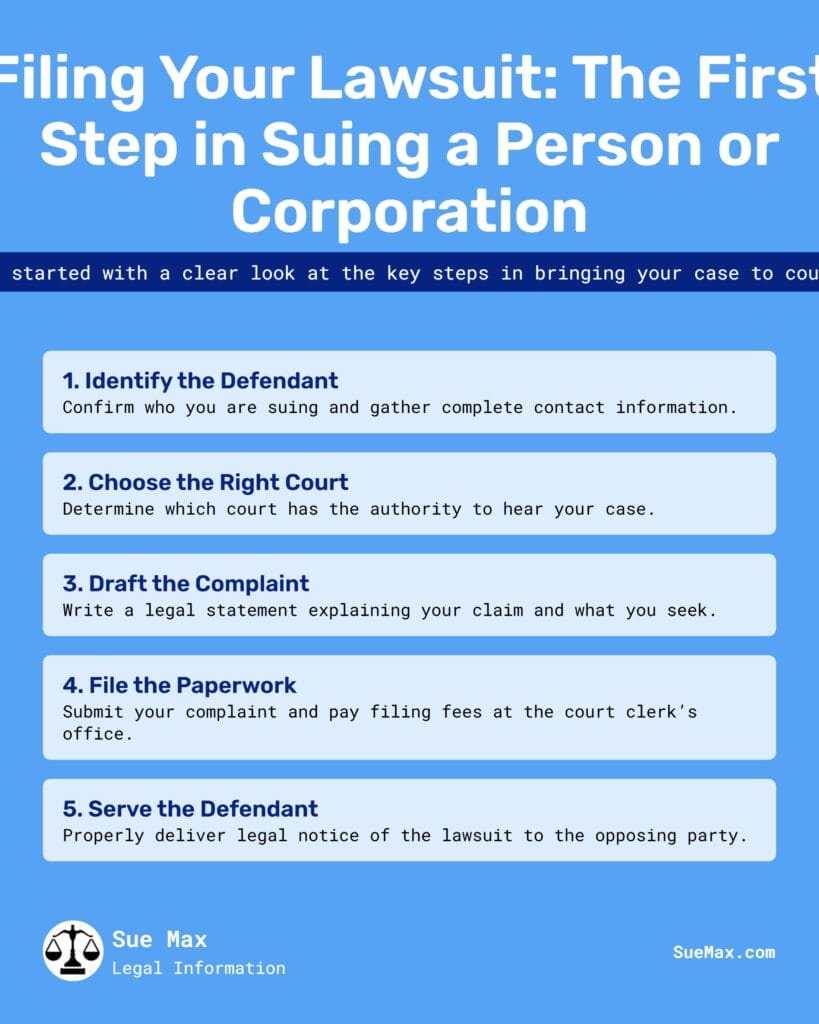
Once you’ve successfully served the papers, whether by channeling your inner ninja or hiring one, it’s important to keep very detailed records of everything. Keep track of when and how service was done, as this information may be useful in court later on. After all, the most important thing is to show that you followed the right steps so that your case can move forward without any problems.
Serving someone doesn’t have to be dramatic or combative all the time. It can even start conversations that you didn’t expect! Imagine this: when you give them the papers, they could want to talk about what happened between you two. No one knows. Maybe there’s room for negotiation before things get worse.
It’s all part of the process, whether you do it yourself or hire someone to do it for you. Accept it as another step toward getting the justice you want, or whatever end you want, and don’t take it too personally if things get strange along the road. Everyone involved is just doing their part in this big legal drama we call life!
The Discovery Phase

👓 During the discovery phase of a lawsuit, lawyers often exchange documents that can include everything from emails to secret recipes. Yes, if you’re not careful, your grandma’s famous cookie recipe could be up for grabs in court! 👓
“Truth is like poetry. And most people f***ing hate poetry.” — David Foster Wallace
The discovery phase is my favorite part! No, this isn’t about finding old things. It’s where both sides get more information through different means, including depositions and interrogatories (fancy word alert!). In short, this means sharing information so that everyone knows what they’re working with before going into war… um… trial.
During discovery, you should expect some shocks. A buried document here or an unexpected witness there can change things faster than my dog can steal food off my plate while I’m not looking. One minute you believe you have a strong case, and the next, BAM! A piece of evidence comes up that messes up your plans. It’s like playing a game of legal Whac-A-Mole: every time you think you have the facts straight, another mole pops out to keep you on your toes!
The Discovery Phase: Uncovering the Hidden Gems
– The Interrogation Party: During discovery, lawyers can send written questions called interrogatories. It’s like a game of 20 Questions, but instead of guessing if someone is an alien, you’re trying to figure out their secrets. Spoiler alert: no one ever asks about aliens.
– Document Treasure Hunt: Lawyers often request tons of documents. Imagine going through your old school papers and finding that embarrassing report card! Now imagine doing that with legal documents. It’s like an episode of “Hoarders,” but with more legal jargon and fewer cats.
– Depositions are Like Movie Auditions: In a deposition, witnesses answer questions under oath, kind of like auditioning for a movie role—but without the glamour. Instead of getting cast as a hero or villain, you might just end up being known as “the person who forgot what they had for lunch.”
At this point, you need to really delve deep and find all the facts that is important to your case. You will be giving and receiving documents, answering questions under oath (yep, it’s as serious as it sounds), and maybe even going through depositions, which are when witnesses tell their story while lawyers ask them tough questions. It’s like a really hard game show, except there are no awards at the end (unless you count winning your case as a prize).
It’s important to keep organized at this crazy period because trust me, chaos just leads to confusion, and nobody wants that when millions are at risk! Picture yourself attempting to find that important email in a pile of papers while also getting calls from your lawyer asking for updates. You could feel like you’re drowning in a sea of legal terms and due dates.
Making a precise timeline of events connected to your case is a great way to help. This will give you a clear picture of what happened when and how each piece fits into the whole thing. You could even color-code things to make them easier to find. Who doesn’t appreciate a little organization flair? It will be easy to find inconsistencies or missing information if everything is written out properly.
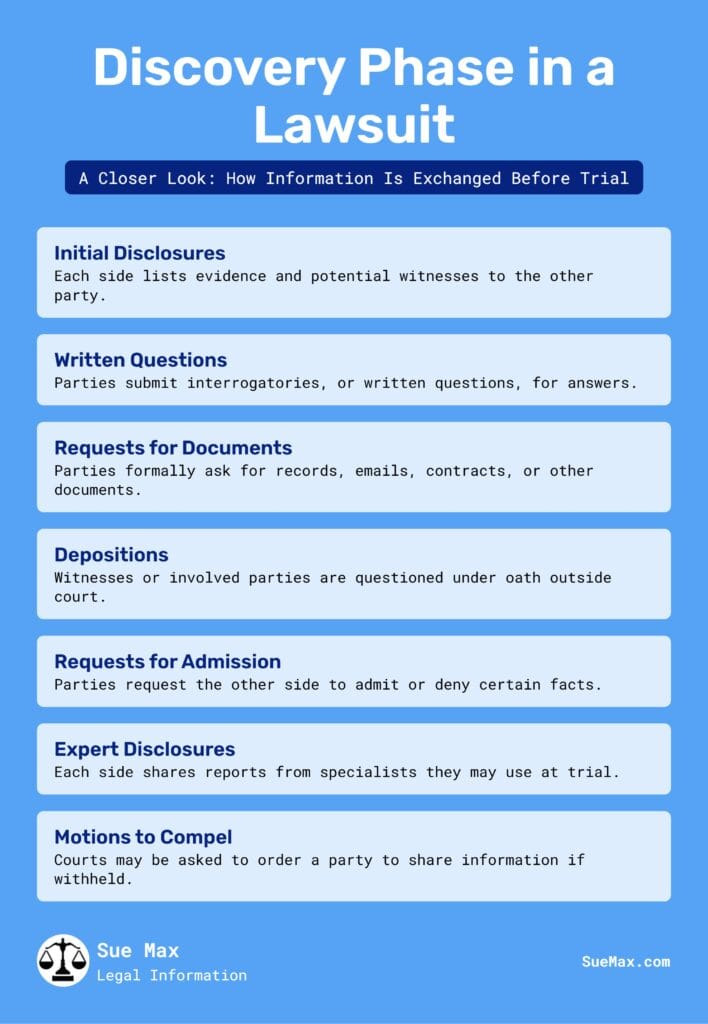
Think about making a separate folder (either real or digital) for all of your discovery-related documents. Give it a name that will stick in people’s minds, like “The Treasure Chest” or “Legal Goldmine.” Trust me: organizing everything will save you hours of stress later when you’re desperately looking for that one important document that seems to have disappeared.
And don’t forget to talk to your lawyer throughout this time! Regular check-ins can assist make sure that everyone knows what has been found and what still needs to be done. They can also help you understand any unexpected turns that come up along the route.
Some people don’t realize how important it is to get ready for discovery. They think it’s only about getting papers and witness statements, but it’s also about being ready for everything that can happen! Getting ready for unexpected revelations might make this stage a lot less scary.
So keep this in mind: enjoy the surprises that come with discovery! Surprises might be scary (like when you find out your favorite food has mysteriously disappeared), but they can also be chances to make your case stronger or improve your plan for the future. Stay organized, be honest with your legal staff, and have an open mind. You never know what gems might be hiding in all that documentation!
Going To Trial

👓 In some courtrooms, jurors are allowed to take notes during the trial. However, if they doodle too much, their sketches might end up as evidence—imagine a courtroom filled with stick figures and superhero drawings! 👓
“Justice is truth in action.” — Benjamin Disraeli
If the discussions to settle don’t work out—and they don’t always—it’s time for trial day! This is when all those practice sessions come in handy, because you’ll need all the confidence you can get when you present your case to a judge (and maybe a jury). Do you remember those practice sessions? Now is when they are useful!
The trial itself starts with opening speeches from both sides, then they present evidence and call witnesses. All of this has to be done according to stringent judicial regulations (don’t forget that!). It’s like the big finish of a legal performance, when each side gets to show off their greatest points in front of a judge (and sometimes a jury), who will then decide what happens. Imagine that you are wearing your best clothes and are probably feeling a mix of nerves and excitement, as when you first go on stage but with a lot more paperwork.
Going to Trial: The Legal Circus Begins
– Jury Duty: The Ultimate Reality Show: Serving on a jury is like being part of a reality show, but instead of getting voted off the island, you might end up deciding someone’s fate. And there are no rose ceremonies—just a lot of serious faces and snacks in the break room.
– The Gavel’s Power: When a judge bangs their gavel, it’s not just for show. It’s like the ultimate “quiet down” signal. But here’s the twist: if you think they do it dramatically in movies, wait until you see how many times they have to do it to get everyone’s attention!
– Objection! A Legal Game: Lawyers often shout “objection!” during trials like they’re playing an intense game of Whac-A-Mole. Each objection is like trying to pop up and say, “Nope, that doesn’t count!”—but instead of moles, it’s all about legal arguments and evidence!
Opening words set the tone for what will happen next. Each lawyer gets a set amount of time to present their case and convey their side of the story. It’s like seeing two chefs compete on a food show, each wanting to wow the judges and the audience with their signature dishes. You want your story to be interesting and easy to understand so that everyone knows why you’re there and what you want to do. This is your time to get noticed!
Then it’s time to have some fun and show proof! This is where all those late nights spent sorting papers come in handy because you’ll need everything right now. Every piece of evidence, whether it’s a photo, a contract, an email, or an expert witness statement, helps back up your claims. If you think of it as putting together a jigsaw, the whole picture could be wrong if one piece is missing or in the wrong position. And let’s be honest: no one wants their jigsaw to appear like it was put together by someone who drank too much coffee!

Next, witnesses are called, which might feel like casting actors in a court drama. You want people who can give you useful information or experiences that are relevant to your case. Their stories may make boring statistics come to life and help you win people over. But here’s the problem: the credibility of the witness is important! The other side will probably try to find flaws in their stories faster than I can eat a whole pizza on movie night.
This may sound exciting, but remember that laws of decorum in court are very serious. Everyone needs to act right. Don’t yell “Objection!” unless you are a lawyer, and even then, do it with flair. Dress smartly, treat the judge respectfully, and avoid any outbursts that can make you look like you belong on reality TV rather than in a serious situation.
At this point in our trip together, you might be wondering, “Isn’t there an easier way?” Yes, sometimes it’s worth every nerve-wracking second spent waiting for that conclusion to speak up for yourself. There are other options, like mediation, when people talk things over with a judge over coffee instead of fighting in front of a judge. But let’s be honest: nothing beats the thrill of fighting for what’s rightly yours.
Going through a trial can be scary; when things get bad, it can feel like the best thing to do is give up and walk away. But think about how empowering it may be to stand up to problems! When you take ownership of your circumstance, you send a strong message: “I won’t back down!” Also, think about how good it would feel when justice is done after all those tense times when you were waiting.
The trial process may seem long and boring at times, but keep in mind that it’s all part of finding a solution! No matter if you started this adventure to clear your name or get your money back, keep that in mind. So get ready for those opening comments, because once they start coming out? You can’t go back now!
Conclusion: Is It Worth It?
So, after all this information overload—let’s take a moment for reflection: Is pursuing legal action truly worth it? That depends entirely on each unique situation! On one hand—yes—it might lead to justice served hot and fresh right outta court; on the other hand… well… lawsuits aren’t cheap nor quick!
Ultimately weighing pros against cons becomes vital before embarking upon this journey filled with paperwork galore and emotional roller coasters aplenty—not unlike riding Space Mountain at Disney World but without any fun music playing in background!
To wrap things up nicely—as we learned today—the process of suing anyone takes careful consideration coupled with strategic planning throughout each stage involved along way ahead toward resolution achieved hopefully soon enough!
Suggested External Resources
Understanding Civil Litigation
https://www.nolo.com/legal-encyclopedia/understanding-civil-litigation-29733.html
The Basics of Filing a Lawsuit
https://www.lawyers.com/legal-info/research/the-basics-of-filing-a-lawsuit.html
A Beginner’s Guide to Small Claims Court
https://www.findlaw.com/litigation/small-claims/a-beginner-s-guide-to-small-claims-court.html
Frequently Asked Questions
What does it mean to sue someone or a corporation?
Suing means filing a legal claim against a person or company for damages or wrongdoing. It’s a formal process to seek compensation or justice through the courts.
How do I know if I have a valid reason to sue?
You need a legitimate legal basis, such as breach of contract, negligence, or injury. Consulting a qualified lawyer can help determine if your case is strong enough.
What type of evidence is most important in a lawsuit?
Key evidence includes contracts, photos, messages, and witness statements. Well-organized and credible proof strengthens your position significantly.
Why should I hire a lawyer instead of representing myself?
Lawyers understand procedures, legal strategy, and deadlines. Having one ensures your documents, filings, and arguments meet professional standards and improve your odds of success.
What happens after I file a lawsuit?
After filing, the defendant must be formally served. Both sides then exchange evidence during discovery before potentially going to trial if no settlement is reached.
What should I expect during the discovery phase?
Each side shares documents, answers written questions, and conducts depositions. It’s an information-gathering stage designed to clarify the facts before trial.
How long does a typical lawsuit take to resolve?
It varies by case complexity and court schedule, often lasting months or even years. Staying patient and organized helps manage the lengthy legal process.

Kevin Collier is a legal expert passionate about simplifying complex legal concepts for everyday individuals. With a focus on providing clear, practical information, he covers a wide range of topics, including rights, responsibilities, and legal procedures. Kevin aims to empower readers with the knowledge they need to navigate the legal landscape confidently, ensuring they can make informed decisions regarding their legal matters. Through insightful articles and easy-to-understand resources, he helps demystify the law, making it accessible to all.

